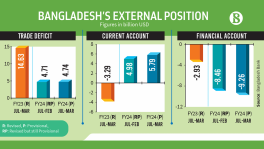How permissioned blockchains can revolutionise Bangladesh’s financial institutions
Introduction of permissioned blockchain technology will make loan disbursement and other financial transactions faster, more transparent and more SME-friendly

In 2020, at least four banks in Bangladesh were offering LC settlement services via the blockchain. This included Prime Bank Ltd., City Bank Ltd., Standard Chartered Ltd. and HSBC.
While cross-border LC transactions may take as high as 10 days, using Contour, a blockchain, Prime Bank Ltd expects settlement time to be reduced to as low as 24 hours.
Furthermore, in January 2021, another cross-border LC transaction was completed using blockchain by City Bank Ltd.
Officials at City Bank Ltd claimed that the traditional LC settlement process takes up to 72 hours to complete. Using blockchain the transaction was completed in 38 minutes.
The power of blockchain is now finally being harnessed here in Bangladesh.
In 2008, an anonymous inventor going by the pseudonym Satoshi Nakamoto released a paper titled - "Bitcoin: A Peer to Peer Electronic Cash System ''.
This paper laid the technical blueprint for a peer to peer cashless transactions ecosystem that requires no intermediation.
Blockchain technology is a type of Distributed Ledger Technology (DLT). To append new data to the existing chain of blocks (existing records of data - i.e. the existing ledger), participants need to validate the legitimacy of the data being added to the ledger. This process is called the consensus mechanism.
Once validated, the new data is appended to the ledger and broadcasted such that every participant has a copy of the updated ledger.

However, not all blockchains are the same. Nakamoto's version of blockchain has no central administrator, allows anyone to join the blockchain, make transactions, validate transactions and maintain anonymity.
Furthermore, a consensus is obtained using a process called Proof of Work (PoW), which involves validating new transactions in a blockchain using cryptography. This version of the blockchain, advocated by Nakamoto, is known as permissionless blockchains.
Traditional Banking processes are generally asynchronous. Throughout these processes, the information passes from one intermediary to another in a relay-like manner (i.e. asynchronous), increasing the explicit costs of the transaction, the lead time and exposure to unforeseeable systematic risks.
While blockchains could eliminate these inefficiencies there remain some fundamental challenges.
Financial institutions like banks have access to data that can be classified as confidential, like a client's NID, Passport number, Bank account information, address, etc. Since permissionless blockchains allow anyone from the public to have access to this sensitive information, they are not suitable for financial institutions like banks.
Furthermore, since permissioned blockchains use PoW to validate transactions, the reward for validators is in the form of cryptocurrency. Possession of cryptocurrencies is illegal in Bangladesh, according to central bank regulations. PoW is also highly power-consuming.
Evidently, challenges involving permissionless blockchains are not only strategic but also legal and environmental.
To solve these problems, in 2015, Linux Foundation created the first permissioned blockchain - Hyperledger Fabric. Eventually, 80 companies including IBM and Intel joined this initiative to develop enterprise-level blockchains - especially for financial use cases.
Unlike Permissionless blockchains, Permissioned blockchains usually have an administrator for coordination. Administrators can admit vetted participants into these blockchains.
Since selected and known participants are allowed in the network, the degree of trust is higher. This relaxes the need to use the highly inefficient PoW as a Consensus Mechanism.
Globally, some of the most prominent permissioned blockchains are Hyperledger, Ripple, R3 Corda and Quorum.
The blockchain-based L/C transactions made by the local banks in Bangladesh were settled using Contour - a blockchain built on the R3 Corda, which is the permissioned blockchain backed by a consortium of around 70 financial institutions.
LC is not the only settlement process being disrupted by blockchain. Currently, Bangladesh earns one of the highest amounts of remittance from Malaysia.
However, the process to transfer remittance to Bangladesh has too many complexities.
As a result, in September 2020, bKash Ltd. has introduced blockchain-based remittance transfer from Malaysia, in partnership with Valyou (a Malaysian Company founded by Telenor Group).
Under this arrangement, expatriates in Malaysia will be able to use their Valyou mobile accounts to directly send money to bKash wallets in Bangladesh.
The transfer is expected to be cleared in real-time.
Furthermore, according to Ledger Insights, it is estimated that sending remittance to Bangladesh can cost as high as 11.78%. According to the World Bank, as of Q2, 2020, the average cost of sending remittance to Bangladesh was 4.03%. Compared to this, using blockchain technology to send remittance via Valyou wallet will cost expatriates only 2.87% approximately.
Ensuring the synchronous flow of information is not the only benefit of using permissioned blockchains. Blockchains can also improve financial inclusivity.
For instance, at least 80% of all enterprises in Bangladesh are small and medium enterprises. These enterprises contribute 20.25% to the GDP of Bangladesh, yet they lack credit support because of a lack of assets to keep as collateral and a lack of proper documentation.
In 2019, Ant Group introduced Duo-Chain to provide blockchain-enabled supply chain financing solutions for SMEs. Duo-Chain focuses on lending money to SMEs that are upstream partners or suppliers of large corporations.
This means when a large corporation places an order for raw material procurement, any SME in that corporation's upstream value chain can secure instant supply chain financing via Duo-Chain using the invoice of the corporation. This invoice acts as an endorsement that the loan is most likely to be repaid.
Duo-Chain synchronises this information between the core participants – corporations, lenders (financial institutions), borrowers (SMEs), and Credit Rating Agencies, ensuring supply chain financing in minutes instead of days.
In December 2019, IPDC Ltd. (NBFI) launched Bangladesh's first blockchain-based supply chain platform - Orjon. The features of Orjon resemble the functionalities of Ant's Duo Chain. Full-scale implementation of Orjon will ensure financing for thousands of small businesses and will cut loan approval and disbursement time significantly.
So far, even though use cases of permissioned blockchains are limited in Bangladesh, it must be acknowledged that even the most pressing issues of the banking sector can be solved using blockchain.
For instance, banks in Bangladesh have long been suffering due to bad loans. Historical events indicate that even when cases were filed against the defaulter, and the court had ruled in favour of liquidation of collateral to realise debt, the banks often realised that the property held as collateral had either been modified, transferred or sold, making liquidation more difficult or not possible at all.
Several US-based companies, like DreamzTech, have introduced Secure Collateral Management using blockchain technology to close collateral related loopholes. In such solutions, each collateral is tracked as a digital asset to track the origination, trail of records and act as a single source of truth of collateral on the blockchain network.
Going forward, financial institutions need to be flexible and proactive in adopting these solutions. However, a regulatory sandbox is required for blockchain technology to flourish in Bangladesh.
In March 2020, ICT Division released Bangladesh's first national blockchain strategy. The document entails a three-phase strategy that ultimately aims to establish a comprehensive regulatory sandbox and a National Blockchain Platform.
The national blockchain platform will be a cloud-based permissioned blockchain hosted under the authority of the corresponding agency of the Government of Bangladesh, which would allow local companies to create blockchain-based services.
Currently, only a few large-scale companies have the resources to adopt blockchain. However, successful implementation of the National Blockchain Strategy would enable all companies to harness the power of permissioned blockchain.


 Keep updated, follow The Business Standard's Google news channel
Keep updated, follow The Business Standard's Google news channel
















